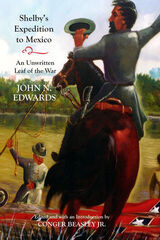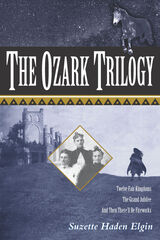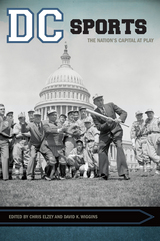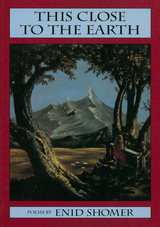6 have author last names that start with E have author last names that start with E

Confederate general Joseph O. Shelby and his legendary Iron Brigade refused to acknowledge the end of the Civil War. Instead, they fought their way to Mexico in search of a place where they could continue to defy the U.S. government. These veteran Missouri cavalrymen clawed their way for fifteen hundred miles, fighting Juaristas, Indians, desperados, and disgruntled gringos. They disbanded only after they had offered their services to Emperor Maximilian and were turned down.
Shelby’s adjutant, journalist John N. Edwards, first published his story of the exploits of this superb mounted brigade and its quixotic final march in 1872. Conger Beasley provides a lively introduction that includes the first biographical sketch of the author. The 1969 movie The Undefeated starring John Wayne and Rock Hudson was based upon Shelby’s expedition.

The Ozark Trilogy (previously published in 1981, Doubleday) is a widely acclaimed fantasy/science fiction story with, as the title suggests, very strong ties to the Ozark region. Twelve Fair Kingdoms, The Grand Jubilee, And Then There’ll Be Fireworks—the books that comprise the trilogy—chronicle life on the planet Ozark and its Confederation of Continents, which are appropriately named Arkansaw, Oklahomah, Mizzurah, Tinaseeh, Kintucky, and Marktwain. However, the story told here involves much more than a mere transplant of Ozark culture and heritage onto a new planet. While this new Ozark culture maintains and even intensifies many of the “real” Ozark traditions and customs (for instance, “Grannys” hold significant, stabilizing social roles and are important sources of wisdom), the planet Ozark combines many new, fantastical elements with traditional ways. Mules on Ozark fly, and the wise “Grannys” also work magic.
The protagonist of The Ozark Trilogy, Responsible of Brightwater, appears at the center of Ozark society, a society she must save from evil magic, civil war, and, ultimately, alien invasion. As Responsible travels from continent to continent in an attempt to discover and squelch the evil magic and calm the civil unrest, we are witness to many dangerous and sometimes comical adventures along the way, including a spectacular flying Mule crash and a magic duel with a Granny gone bad.
Elgin has created a fantastic world infused with the folk traditions, social and familial hierarchies, and traditional dialect of the Ozarks. While parallels might be drawn between, for example, the break-up of the Confederacy of Continents on planet Ozark and the American Civil War, Elgin comments on aspects of Ozark history and tradition in a non didactic way. The trilogy, with its strong heroine and witty engagement of tradition, is a classic of Ozark literature.

Lead short story featured in 1993 Best American Short Stories
A wide variety of characters saunter, stalk, run, and sometimes hide in these lively stories about contemporary Southerners. Their experiences revolve around the way life is felt and the way it is lived, reflecting a gap between the plans we make for ourselves and the way things actually turn out. From the jungles of Vietnam to the bayous of Louisiana, from the French countryside to Vicksburg, Mississippi, Ely’s stories reveal how human beings’ unpredictable, unconscious motivations will have their say no matter what steps are taken to silence them.
Certain shadows fall over all the characters—especially the shadows of the Vietnam experience and the struggle between a traditional Southern heritage and the conflicting ideals of contemporary society. The characters in Ely’s stories seem powerless to defend themselves against the ever-changing expectations of a modern life, and yet they gain a new humanity and depth when, with dignity, they embrace their limitations.

A southern city at heart, Washington drew a strong color line in every facet of people’s lives. Race informed how sport was played, written about, and watched in the city. In 1962, the Redskins became the final National Football League team to integrate. That same year, a race riot marred the city’s high-school championship game in football. A generation later, race as an issue resurfaced after Georgetown’s African American head coach John Thompson Jr. led the Hoyas to national prominence in basketball.
DC Sports takes a hard look at how sports in one city has shaped culture and history, and how culture and history inform sports. This informative and engaging collection will appeal to fans and students of sports and those interested in the rich history of the nation’s capital.


READERS
Browse our collection.
PUBLISHERS
See BiblioVault's publisher services.
STUDENT SERVICES
Files for college accessibility offices.
UChicago Accessibility Resources
home | accessibility | search | about | contact us
BiblioVault ® 2001 - 2024
The University of Chicago Press









